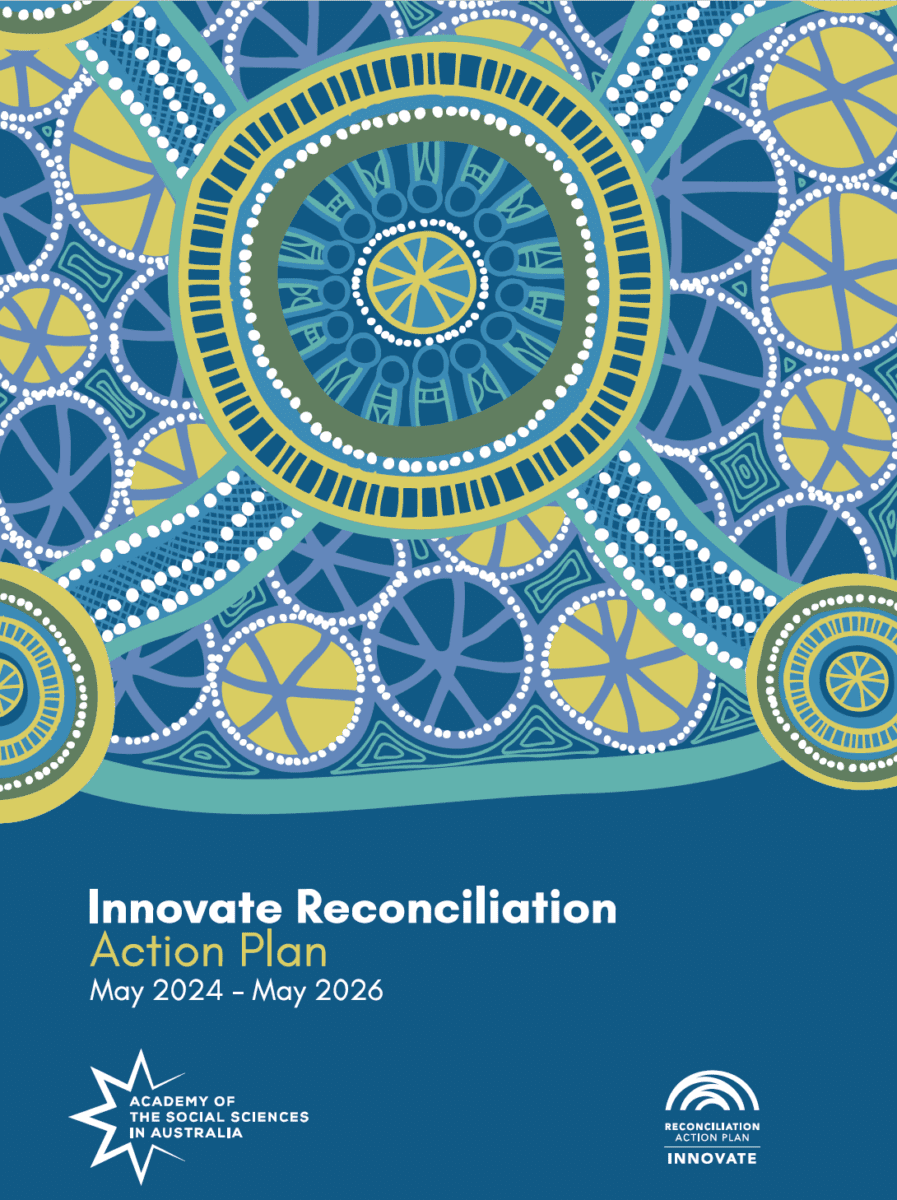Acknowledgment
The Academy of the Social Sciences in Australia acknowledges Traditional Owners of Country throughout Australia and recognises the continuing connection to lands, waters and communities.
We pay our respect to Aboriginal and Torres Strait Islander cultures; and to Elders past and present.
Our vision for Reconciliation
The Academy of the Social Sciences in Australia envisions a society that fully recognises, values and celebrates the continuing knowledge systems and custodianship of Aboriginal and Torres Strait Islander peoples, guided by the principles of the United Nations Declaration on the Rights of Indigenous Peoples. Only when Aboriginal and Torres Strait Islander peoples are represented and heard at all levels of education, research and leadership in the social sciences, including First Nations scholars elected to the Academy, will we fully realise the significant and inherent value of traditional and contemporary First Nations knowledge to the social systems that shape our lives.
Reconciliation Action Plan
The Academy’s Innovate RAP was proudly launched in June 2024.
This followed the launch of the Academy’s inaugural Reflect Reconciliation Action Plan, that was launched in June 2021. Read the Outcomes Report for the Academy’s Reflect RAP.
Implementing an Innovate RAP signals the Academy’s readiness to develop and strengthen relationships, engage staff and stakeholders in reconciliation, and pilot innovative strategies to ensure effective outcomes.
Karen Mundine, Reconciliation Australia CEO
Artwork
The Academy’s bespoke artwork was developed by Indigenous design and digital agency ingeous studios, whose stylised design represents the work of the Academy and its Fellows. The design tells a story about the work of the Academy in improving the lives of Aboriginal and Torres Strait Islander people and communities through inclusion, knowledge sharing and understanding.
Reconciliation actions
In our first RAP, the Academy set ambitious targets to raise the bar on our impact and performance. We are proud of our achievements since we commenced our reconciliation journey and have learnt lessons along the way which we will draw on as we deliver our Innovate RAP. Through our communications and events, we continue to highlight and profile the work of Aboriginal and Torres Strait Islander social scientists and promote reconciliation.
During COVID we developed an Acknowledgment of Country video featuring Fellows of the Academy (below). This video is now proudly used by the Academy and other organisations for online and in-person events and meetings.
Academy media and videos
The Academy has leveraged our external communications platforms to recognise, champion and support Aboriginal and Torres Strait Islander peoples and causes.
- In November 2021 our Annual symposium featured Indigenous and non-Indigenous panellists discussing how Australia can achieve meaningful reconciliation with First Nations people (video below).
- In February 2022, our Fay Gale lecture featured Indigenous Professor Chealsea Watego: No room at the Inn: Rethinking critical race studies and its place in the Australian Academy (video below).
- In February 2022, the Academy partnered with BBC StoryWorks and the International Science Council to publish an article Giving new life to old languages which outlines the renewal of First Nations languages in an audio-rich and dynamic way.
- In 2023, the Academy interviewed professor Tom Calma AO on the hopes he has for the Aboriginal and Torres Strait Islander community, and all Australians, in the wake of the Voice Referendum (video below).
- In 2024, the Academy launched its Seriously Social school program with resources on civics and citizenship, including a short educational video providing information about the Australian Constitution and the process for a referendum, to assist in understanding the 2023 Voice referendum (video below).
- As part of National Reconciliation Week 2024, the Academy delivered a collaborative webinar Exploring Indigenous Research: Conducting ethical research and improving access of research outcomes to Aboriginal and Torres Strait Islander peoples with AIATSIS.
Language
Using respectful and inclusive language and terminology is an essential component of reconciliation. The ways we speak about reconciliation are just as important as the ways we act: language is itself active and can impact attitudes, understandings and relationships in a very real and active sense. While they are guidelines only, here are some recommendations for using respectful and inclusive language and terminology from Reconciliation Australia.
